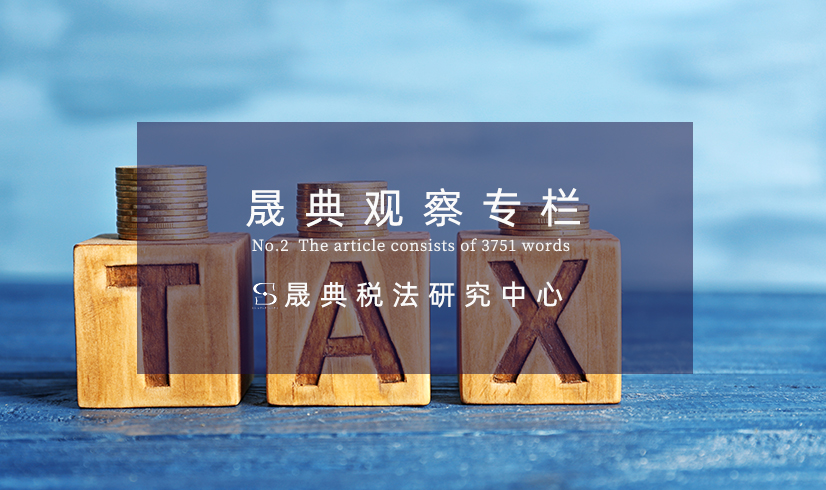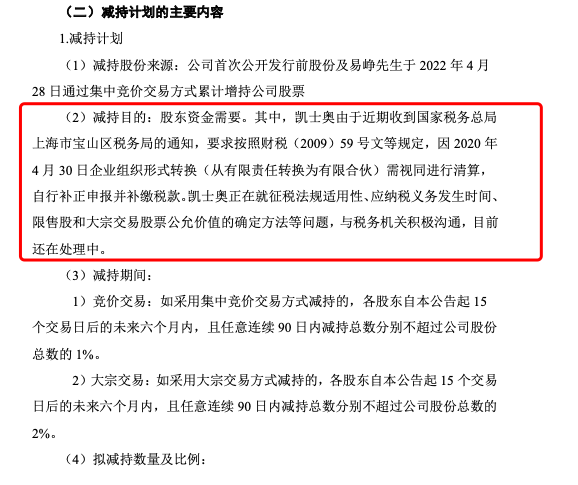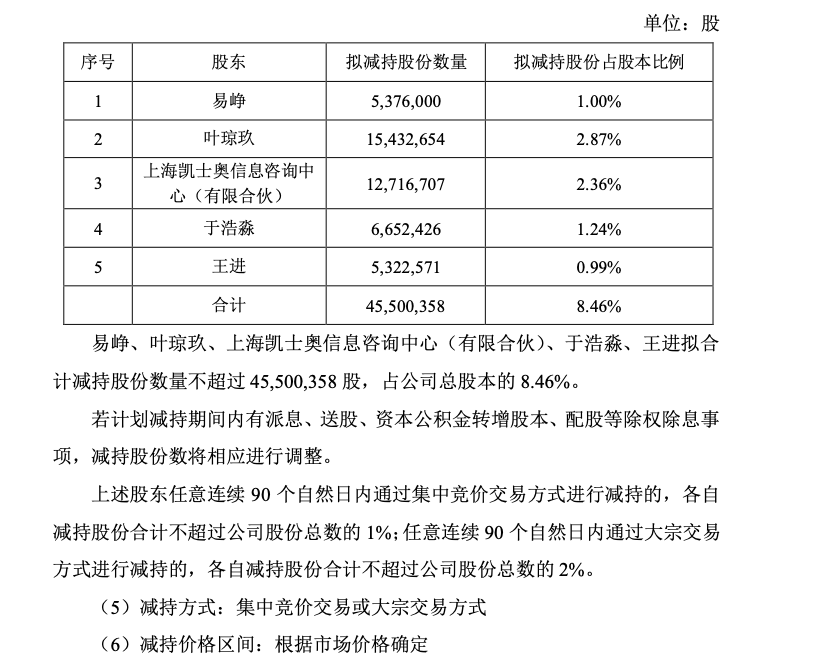According to the "Securities Daily" report, on the afternoon of March 20, the annual shareholders meeting of the listed company Flush (stock code: 300033) was held in Hangzhou. The management of Flush responded for the first time to the "tax supplement storm" on the core employee stock ownership platform. According to the report, the reporter learned from people familiar with the matter that in November 2022, Shanghai Caishio Information Consulting Center (Limited Partnership) (hereinafter referred to as "Caishio") received the "Notice on Tax Matters" from the Shanghai Baoshan Branch of the State Administration of Taxation., The notice stated that it was "suspected of failing to declare and pay taxes in the process of changing the organization form" and required to pay 2.5 billion yuan in taxes. This incident has attracted great attention from all parties, and this paper attempts to sort out the context and logic of the incident from a tax perspective.
According to the national enterprise letter system, enterprise check and flush announcement content shows:
- On August 24, 2007, KASIO was established as a limited liability company in Shanghai.
- On August 30, 2007, the original shareholders of Tonghua Shun transferred a total of 20% of their shares to CASO in order to motivate the backbone of the business and key management personnel.
- December 25, 2009, flush listed on the Shenzhen Stock Exchange GEM. According to the contents of the IPO "Prospectus" of Flush: Keschio promises to fulfill the 12-month lock-up period after listing, and after the end of the lock-up period, the annual transfer of shares shall not exceed 25% of the total number of Flush shares held.
- At present, Keshio is the third largest shareholder of flush, holding 9.46 per cent of the shares and seven natural person partners, all of whom are employees of flush.
- Keschio has experienced many changes in business information. The most important of these was the move to Beijing in March 2020, the following month from a limited liability company to a limited partnership, and the move back to Shanghai in June of the same year in the form of a limited partnership, and the name was changed to Shanghai CISO Information Consulting Center (Limited Partnership). According to the contents of announcements such as No. 2020-041, No. 2021-020, No. 2022-021, etc., after the change in organizational form, Keso is still reducing its holdings of shares with unlimited sale conditions.
It is precisely because of the cross-regional transformation of the "company into a partnership" that the Shanghai Tax Bureau believes that Cessio "is suspected of failing to declare and pay taxes in the process of changing the form of organization" and needs to pay a huge amount of back taxes.The author believes that the following four issues are worth discussing:
First: Why the change in organizational form?
Second: Is such a change in organizational form legal?
Third: What is the reason for the tax requirement?
Fourth: What are the consequences?
First: Why the change in organizational form?
In addition to flush, there are a number of cases in which boss companies have converted their shareholding platforms from companies to partnerships, such as AllianCloud (stock code: 301042) and Etian (stock code: 300812). The tax advantages of the shift are:
(1) The external transfer of shares by the shareholding platform is subject to a lower tax burden in the form of a partnership.
For example, a holding platform transfers shares with unlimited sale conditions to obtain 10 million income, because the holding platform basically has no substantial business operations, do not consider other costs and expenses. The tax results of different organizational forms are analyzed as follows:
It can be seen that the same transaction, the choice of partnership system will make employees get more income.
(2) Previously, local governments and tax bureaus may introduce special preferential policies, such as financial incentives, approved personal income tax, etc., so that employees of shareholding platforms can enjoy a lower comprehensive tax burden.
Second: Is such a change in organizational form legal?
Currently, there is no specific legal basis for converting a company into a partnership. In our country, the company belongs to the legal person organization, can bear civil liability independently, while the partnership is the opposite, the two are regulated by the Company Law and the Partnership Law respectively.
Therefore, the transformation of a company into a partnership has actually spanned two laws, and there are two legal facts, namely: ① the company is liquidated and written off; ② the shareholders use the proceeds of liquidation to establish a new partnership. Thus, the registration rights granted by law to the industrial and commercial authorities are: cancellation of registration and establishment of registration.
However, in practice, some places have explored and issued some policies to support the change registration for the purpose of attracting investment. For example, the Beijing Administration for Industry and Commerce's "Trial Measures for the Registration of the Transformation of Enterprise Organization Forms in Zhongguancun National Independent Innovation Demonstration Zone" (Beijing Industry and Commerce 2010 No. 131), and the Xinjiang Administration for Industry and Commerce issued the "Xinjiang Administration for Industry and Commerce on the Change of Limited Liability Companies" Guiding Opinions on Partnership Enterprises "(New Industry and Commerce Enterprise 2010 No. 172), etc., as long as the required information is submitted, the company can be directly changed to a partnership enterprise.
Third: What is the reason for the tax requirement?
According to paragraph (I) of Article 4 of the Circular on the treatment of Enterprise income tax on Enterprise restructuring Business No. 59 of the Ministry of Finance and Taxation [2009], "if an enterprise is transformed from a legal person to a sole proprietorship enterprise, partnership enterprise and other unincorporated organizations, or if the place of registration is transferred to outside the the People's Republic of China (including Hong Kong, Macao and Taiwan), it shall be liquidated and distributed as an enterprise, and shareholders shall reinvest to establish a new enterprise. All of the assets of the enterprise and the tax basis of the shareholder's investment should be determined on the basis of fair value." Therefore, when the shareholding platform is transformed from a company into a partnership, the original company should be treated as liquidation, and the shares of the listed company held by it should be determined at fair value to determine the gain or loss on disposal and pay corporate income tax; secondly, the gain or loss on disposal should be treated as distributed to employees, who should pay personal income tax. The closing price on the day of the completion of the organizational change was 119.45 yuan/share, the number of shares held was 50.9156 million shares (including restricted shares), and the total fair value was 6.082 billion yuan. According to the above case description, the total amount of double tax payment was 60.82*40%= 2.433 billion yuan.
Obviously, Kaishio did not declare tax when it completed the transformation in Beijing, and now it is required by the Shanghai Taxation Bureau to make up the tax. On the one hand, it reflects that the tax authorities and the industrial and commercial authorities have not achieved a good linkage and there are regulatory loopholes; on the other hand, it also reflects that taxpayers need to be more careful in understanding and applying regional policies. In addition, the corporate shareholding platform has been canceled, and it is worth thinking about who will be responsible for the part of the corporate income tax that should be paid.
Fourth: What are the consequences?
For the core staff of flush, such a result is undoubtedly a bolt from the blue. The change of organizational form has not achieved the expected effect. In the absence of cash inflow, it also bears a large tax obligation in advance. According to the latest announcement of Tonghua Shun, Keso currently holds 50,881,829 shares, of which 12,716,707 are unrestricted shares. According to the closing price of 176.33 yuan/share on March 29, the total value of the transferable shares of CASO is 2.24 billion yuan, which is still lower than the amount of supplementary tax.
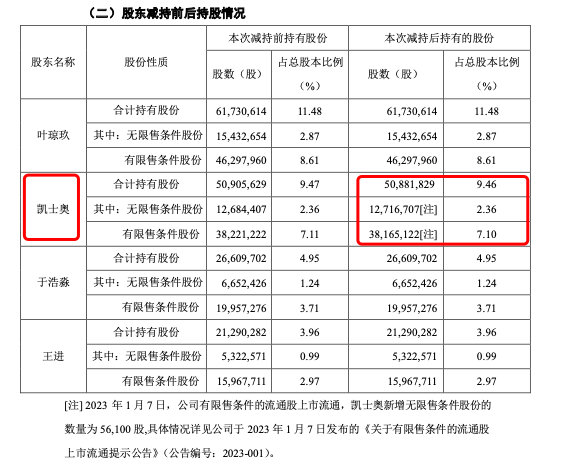
In addition, according to Article 63 of the Tax Collection and Administration Law, failure to declare the change of organizational form may lead to employees (former shareholders of the holding platform) being found to have committed tax evasion, and the tax authorities have the right to recover the taxes and late fees not paid or underpaid, and impose a fine of not less than 50% but not more than five times the taxes not paid or underpaid. If the tax authorities impose administrative penalties on them and the employees fail to pay in full and on time, the provisions of Article 201 of the Criminal Law on the crime of tax evasion will be triggered. At that time, the employees cannot avoid criminal responsibility by the first exemption rule in paragraph 4. However, whether the tax liability of a corporate enterprise can be pursued to shareholders who are not involved in control and operation? Whether the liability for taxes and fines can break through the principle of limited liability of shareholders? In our opinion, it is not without controversy.
According to the Securities Daily, on the afternoon of March 27, flush held its 2022 annual performance briefing. In an interview with reporters, Tonghua executives said, "Over the years, Kasseo has received only $0.3 billion from the sale of shares, far less than the tax and late fees to be levied. As a result, this sudden and huge tax bill is like a mountain of pressure, making it simply unbearable for the company." "Caseo is an employee stock ownership platform, and in the event that the restricted shares cannot be sold, Caseo cannot raise enough funds to pay taxes in full and on time. The company is paying close attention to the ideological trends of its core employees, doing its best to communicate with them, conveying the care of government departments at all levels, and making timely responses to issues of concern to core employees, in an effort to maintain the normal operation of the company and the stability of corporate governance."
On the evening of March 27, Flush issued an announcement stating that due to the need for shareholder funds, the company's actual controller, chairman and general manager Yi Zheng, director and deputy general manager Ye Qiongjiu, the shareholder holding more than 5% of the shareholders Shanghai Kaishi Ao Information Consulting The company, as well as the company's directors Yu Haomiao and Wang Jin, plan to be within 6 months after 15 trading days from the date of the announcement, the reduction was made by centralized bidding or block trading, accounting for 8.46 per cent of the Company's total share capital.
Equity incentive has a positive and significant effect on improving the efficiency of company management and enhancing cohesion. More and more companies want to introduce. However, equity incentive from the establishment to the operation, is a long-term and professional work.
Flush employee stock ownership platform due to the change of organizational form led to deep tax turmoil, whether employees or flush, are affected to varying degrees. The choice of shareholding platform is only part of the tax planning of equity incentive, and the partnership form is not always the best choice for the holding platform for different purposes. How should employees pay personal income tax when exercising their rights? Can the deferred tax policy apply to the employee's share reduction on the stock holding platform? Can the employee's external transfer of shares on the stock holding platform apply the item "income from transfer of property" to pay personal income tax, and can the internal transfer of shares be exempted from paying personal income tax? There are a series of issues that need to be considered at the initial stage of establishment. Therefore, it is recommended that enterprises make comprehensive tax assessment and tax compliance arrangements in the early stage of the introduction of equity incentives to reduce subsequent tax-related risks.
(This article only represents the author's personal views)
Introduction to the Author
Guidance and approval: Wang Yongjing
Senior Partner of Shengdian Law Firm, Director of Shengdian Tax Law Research Center, Registered Lawyer of Hong Kong Kewu Chen Law Firm (ONC) (Chinese Law), Arbitrator of South China International Economic and Trade Arbitration Commission (Shenzhen International Arbitration Court), Expert of the third-party supervision and evaluation mechanism of compliance of enterprises involved in Guangdong Province, Instructor of Master of Law in Central South University of Economics and Law, Off-campus Tutor of Master of Law in Shenzhen University, member of the Tax Law Professional Committee of the All-China Lawyers Association, Deputy Director of the Tax Law Professional Committee of the Guangdong Lawyers Association, and the first phase of the China Certified Tax Association (60 nationwide) high-end tax talents. Master of Accounting and Doctor of Law from Wuhan University, holds professional qualifications such as lawyer, accountant, certified tax accountant, Australian public accountant, certified asset appraiser, real estate appraiser, certified consulting engineer, financial economist, securities and fund practitioner.
Principal Areas of Practice:
Corporate practices such as acquisition, merger and reorganization; Civil and commercial dispute resolution (litigation, arbitration and negotiation mediation); Tax law and taxation (compliance, planning, inspection response, reconsideration and litigation); Comprehensive legal and tax consultant (perennial and special); Investment and financing (VC, PE, large capital management); Cross-border commercial transactions and dispute resolution; Real estate and construction projects.
E-mail:
wangyongjing@shengdian.com.cn
Creation and writing: Cao Wenwen
Practice lawyer of Shengdian Law Firm, member of Shengdian Tax Law Research Center, Chinese tax agent. He has served in a large foreign financial leasing company and served as the legal department of the company's headquarters.
Main practice areas:
Corporate mergers and acquisitions, tax law and taxation, capital markets and other non-litigation matters and related dispute resolution.
E-mail:
caowenwen@shengdian.com.cn
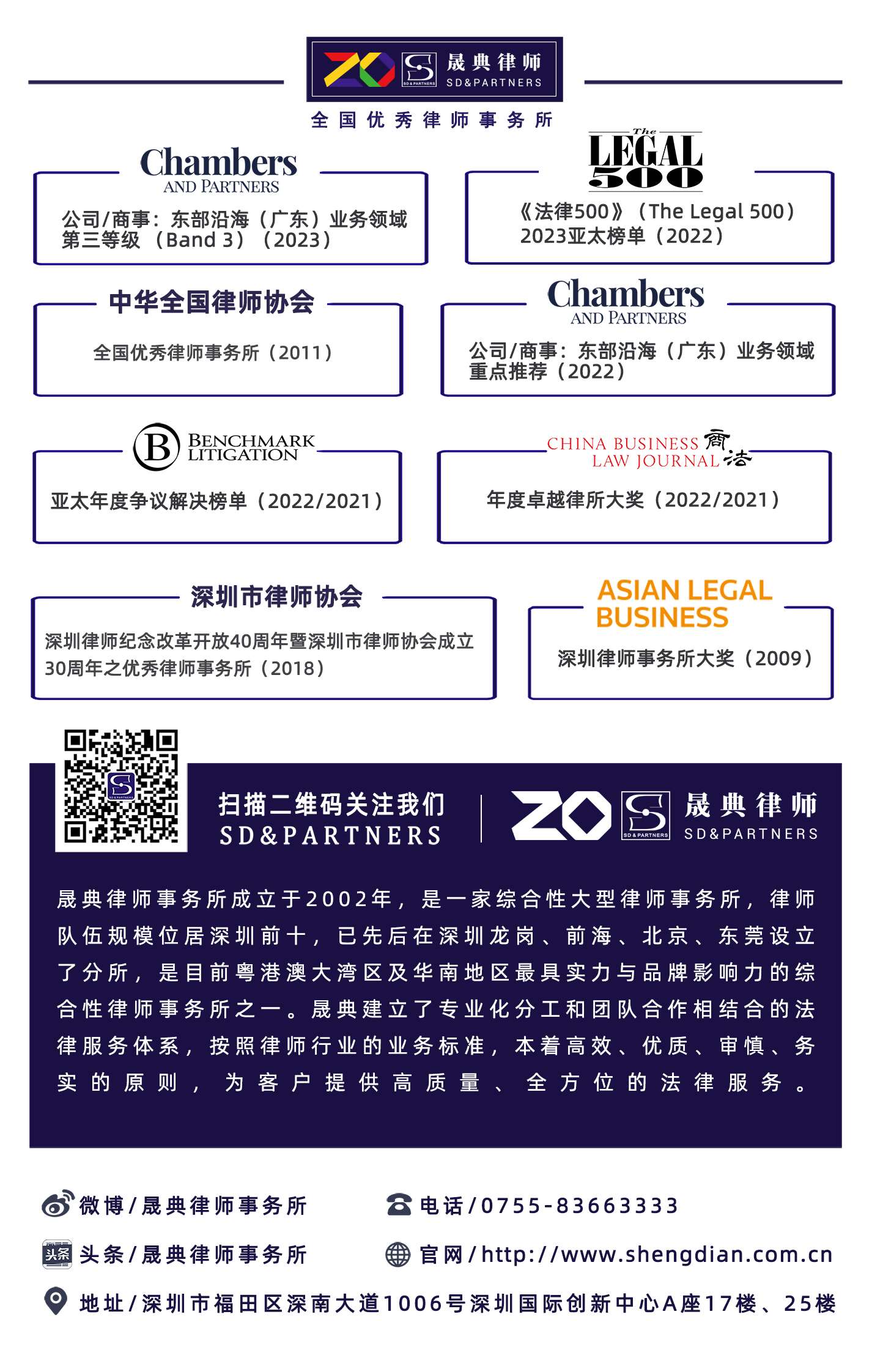
![]() Loading...
Loading...![]() 2023.04.03
2023.04.03